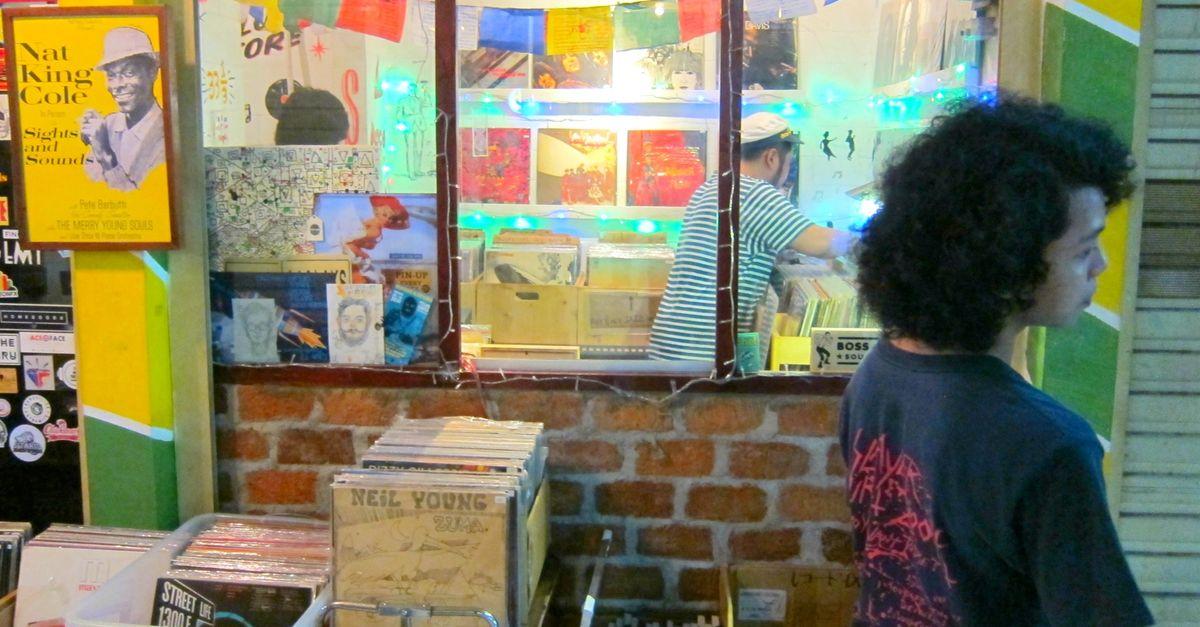Jakarta is having a vinyl renaissance
Samson Pho (behind windows) looks through the inventory in his shop, Laid Back Blues Records.
All over the place, vinyl is undergoing a renaissance.
In the United States, record sales are on the rise, and pressing plants are working around the clock to keep up with demand. But in Indonesia, the last vinyl pressing plants went out of business in the 1980s, their machines long since sold for scrap metal, with no comeback in sight.
Still, in the capital city of Jakarta, record shops are seeing a new generation of music lovers building their old-school collections, despite soaring prices and limited supply.
On Jalan Surabaya, a street of low-slung buildings in Jakarta that has housed record vendors for decades, a few small shops still sell used records, packed beside others peddling discount luggage and antiques. A man known simply as Lian owns Lian Records. He’s seen vinyl’s boom and bust — and now, boom, again — firsthand.
His father opened a record shop on Jalan Surabaya in 1963, and as a boy in the '70s, Lian helped out with the family business, selling cheap secondhand British and American pop records from a handcart.
Nowadays, Lian’s shop offers mostly CDs and cassettes. However, back in 2007, he began seeing more customers interested in buying vinyl: Besides his usual clientele of old-timers and the occasional tourist, teenagers started coming into his shop to scour the record bins, searching for deals and treasures. Demand has hardly let up since then, but Lian has trouble finding enough records to sell. He adds about five new albums to his inventory each month, and the few domestic records he has in his shop are looking tired, their covers worn and the vinyl scratched.
But on the other side of Jakarta, a market called Pasar Santa tells another story. On the top floor of a traditional produce market, at least a dozen record shops jostle for space alongside hip cafés and clothing boutiques. In Pasar Santa’s record stalls, new and used LPs of all genres — from '80s disco to Detroit techno and bugalú — are in abundant supply, most imported from overseas. By sundown, the shops are brimming with people, and when the Muslim call to prayer floats over the market, “Smoke on the Water” keeps playing.
Most of Pasar Santa’s record sellers are young — in their 20s — and many lean on connections abroad for help building their inventory: a friend who goes to college in San Francisco, or a contact in the UK. Samson Pho, who owns a shop called Laid Back Blues, says that much of his stock comes from Europe and Japan. Other records are brought back by friends from their travels.
“Sometimes, my friend coming back from US, he brought me back some records from the $1 bin, because I can sell it [for] at least $50 or $10 here, at least,” he says.
And that’s in American dollars. At Pho’s shop, a Dizzy Gillespie record goes for about 300,000 Indonesian rupiah, or about $30, and a Three Dog Night LP sells for about the same. Four years ago, Pho says he could buy a record on Jalan Surabaya for less than $1. Now, his customers are lucky to find an LP in his shop that sells for less than $10. The most expensive albums are the ones he tracks down himself — vintage Indonesian recordings that are hard to find elsewhere.
“You know, like the pickers, I go around Indonesia,” Pho says. “I go to a radio station, go to the old label and everything, just to buy the old stocks.”
He holds up a copy of “Shake Me” by the Indonesian group, AKA. In a country where you can get a simple meal for $1, and nearly half the population lives on $2 a day, Pho’s copy of “Shake Me” is priced at around $100. It’s a testament to the value — for collectors anywhere — of a tangible piece of history.
“This is the original copy. This is very heavy, heavy funk,” he says.
Pho’s most precious albums are these hard-won Indonesian releases. In fact, he keeps most of them at home for himself, selling the imported records instead. But it should still come as no surprise that Pho is parting with an original pressing of “Shake Me.”
“I have four of these,” he says, laughing. “That’s why I'm selling it here. But for me personally, the Indonesian kind of music that I really like and I really value — that you will never find at my shop, because I always keep it. That’s the thing.”
This article is based on a story by Ian Coss that aired on PRI's Studio 360.
